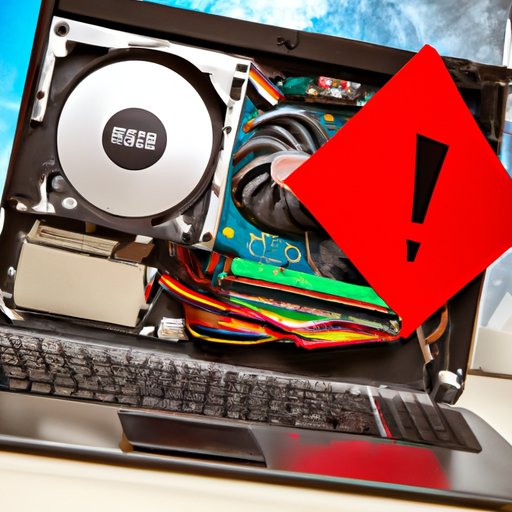Introduction
When you’re trying to get work done, a slow computer can be incredibly frustrating. It’s important to identify the cause of the issue so you can take steps to resolve it. This article will explore some of the most common reasons for poor computer performance and provide tips on how to improve it.

Identify Common Causes of Slow Computer Performance
There are several factors that can lead to slow computer performance. Here are some of the main ones:
Overheating
One of the most common causes of poor computer performance is overheating. When your computer gets too hot, it can cause components to fail or slow down. If your computer is located in an area with poor ventilation, this can increase the chances of it overheating. Additionally, if your fan isn’t working properly, this can also cause your computer to overheat.
Too Many Applications Running Simultaneously
Having too many applications open at once can put a strain on your computer’s resources. If you don’t need to use certain applications, it’s best to close them to free up more memory and processor power.
Outdated Hardware and Software
Another common cause of slow computer performance is having outdated hardware and software. Operating systems, drivers, and programs all require regular updates to ensure they continue to work properly. If these aren’t kept up to date, it can lead to slowdowns and other issues.
Not Enough Memory
If your computer doesn’t have enough memory, it won’t be able to process information quickly. This can lead to slowdowns, freezes, and crashes. To improve your computer’s performance, you may need to upgrade your RAM or add additional memory.
Analyze Your Hard Drive and Memory Usage
Once you’ve identified the potential causes of your slow computer performance, it’s time to take action. The first step is to analyze your hard drive and memory usage. This will help you determine what’s causing the slowdown and what you need to do to fix it.
Check Your Hard Drive Space
Checking your hard drive space is the first step. If your hard drive is almost full, this can cause your computer to slow down significantly. You can check your hard drive space by going to the “My Computer” icon on your desktop and selecting “Properties.” This will show you how much space you have left on your hard drive. If you’re running low on space, you can delete old files and programs to free up more space.
Monitor Your RAM Usage
You should also monitor your RAM usage. Having too many applications open at once can cause your RAM to become overloaded which can lead to slowdowns. To monitor your RAM usage, open the Task Manager (Ctrl + Alt + Delete) and select the “Performance” tab. This will show you how much RAM is currently being used. If your RAM usage is high, you can close programs to free up more memory.
Run a Virus Scan
If you suspect that your computer has been infected with a virus or malware, it’s important to run a virus scan. Viruses and malware can cause your computer to slow down significantly, as well as cause other problems. To protect your computer from viruses, you should download and install anti-virus software and then run a full system scan.

Clean Out Unnecessary Files and Programs
Over time, your computer can accumulate a lot of unnecessary files and programs. These can take up valuable space on your hard drive and slow down your computer’s performance. To clean out these files and programs, you can use the disk cleanup utility. This tool will search for temporary files, junk files, and other unnecessary items and give you the option to delete them. You can also delete any programs that you no longer need or use.
Upgrade Your Hardware
If your computer is still running slow after taking the above steps, you may need to upgrade your hardware. Upgrading your RAM or getting a faster processor can help improve your computer’s performance. You can find detailed instructions on how to do this online.
Consider a Tune-up or System Refresh
If you’ve tried all of the above steps and your computer is still running slow, you may want to consider a tune-up or system refresh. A tune-up involves optimizing settings and removing any unnecessary files or programs. A system refresh involves reinstalling your operating system, which can help to improve speed and performance. Both of these options can be time consuming, but they can also help to improve your computer’s performance.
Conclusion
If your computer is running slow, it’s important to identify the cause of the issue and take steps to resolve it. This article explored some of the most common causes of poor computer performance and provided tips on how to improve it. By analyzing your hard drive and memory usage, running a virus scan, cleaning out unnecessary files and programs, upgrading your hardware, and considering a tune-up or system refresh, you can help to ensure your computer runs more efficiently. It’s also important to remember the importance of regular maintenance to keep your computer running smoothly.


